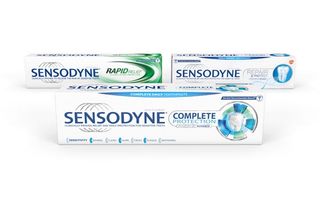5 Reasons Your Teeth Are Sensitive And How To Ease It

This is a woman&home advertorial
Ever experienced a sharp shooting pain when you sip on a cold drink or eat something sweet? Tooth sensitivity affects 1 in 3 of us, making daily meal times a misery for many. This common condition occurs when the delicate dentine layer under tooth enamel becomes exposed.
Dentine has tiny tubes leading to the nerve, which are filled with fluid. Eating or drinking hot, cold or sweet foods and liquids can change the fluid movement, triggering a short, sharp pain.
Tooth enamel is the first line of defence against tooth sensitivity. By identifying exactly what causes this type of enamel erosion you can stop further deterioration and prevent the triggers from reaching the dentine and causing frequent sensitivity.
1. Over Brushing
The first culprit is over brushing. In your over zealous pursuit of squeaky clean pearly whites you might be unintentionally damaging your teeth. Brushing too vigorously, too often or both can wear away the natural enamel that protects the sensitive dentine layer. Despite the temptation to pick up your toothbrush every time you finish a meal or leave the house, dentists recommend brushing just twice a day, morning and night, in gentle circular movements. This will increase your chances of reducing plaque build up across the whole tooth.
2. Receding Gums
Sign up for the woman&home newsletter
Sign up to our free daily email for the latest royal and entertainment news, interesting opinion, expert advice on styling and beauty trends, and no-nonsense guides to the health and wellness questions you want answered.
As we age our gums naturally recede but gum recession can be accelerated by over brushing and gum disease - both of which can expose the dentine causing heightened tooth sensitivity. Daily flossing and light brushing with a Sensodyne fluoride toothpaste are great ways to maintain healthy teeth and gums, particularly if your teeth are positioned close together as this presents your toothbrush with difficult to reach spaces in-between. For the best results curve the floss around the base of each tooth and pull upwards gently, resist the urge to saw sideways as this can cause bleeding and irritation along the gum line.

3. Acid erosion
Whilst all that juicing might be working wonders for your waistline, acidic fruits in healthy drinks can be damaging. Acid from food and drink can soften the hard enamel surface, making it easy for brushing to later wear it away. Citrus fruits, vinegar dressings, wine, juice smoothies and fizzy drinks are prime suspects when it comes to enamel erosion and therefore increased likelihood of sensitivity. If you do indulge in any of these, try to avoid brushing your teeth straight afterwards, instead leave at least an hour for your tooth enamel to re-harden.
4. Grinding
Many people unintentionally grind and clench their teeth whilst they sleep. It’s a common problem, that over time can lead to exposed dentine. Using a Sensodyne desensitising toothpaste can help to relieve sensitivity caused by tooth grinding.

5. Cracked teeth and cavities
Severe sensitivity in one targeted area might be a sign of a cracked tooth or a cavity. If you experience sensitivity in a one specific spot make an appointment with your dentist and get it checked out as soon as possible.
Sensodyne is the No. 1 dentist-recommended brand for sensitive teeth, with a range of desensitising toothpastes specifically designed to relieve the pain of sensitive teeth. Using one of these, such as Complete Protection, twice daily, gives you all the benefits of a regular toothpaste – it helps protect against plaque, maintain healthy gums, restore natural whiteness and freshens breath – but, importantly it creates a protective layer over sensitive areas and strengthens and re-hardens enamel.

-
 Keira Knightley styles the best chocolate brown blazer with a blush pink skirt, coffee tone jumper and white slingback heels
Keira Knightley styles the best chocolate brown blazer with a blush pink skirt, coffee tone jumper and white slingback heelsAn oversized blazer is the answer to our cold-weather styling dilemmas
By Molly Smith Published
-
 Shetland season 9 ending explained: Who murdered Annie and Bergen?
Shetland season 9 ending explained: Who murdered Annie and Bergen?We delve in the Shetland season 9 final episode to unpick everything happened, and find out who was responsible for the death of Annie and Bergen.
By Lucy Wigley Published